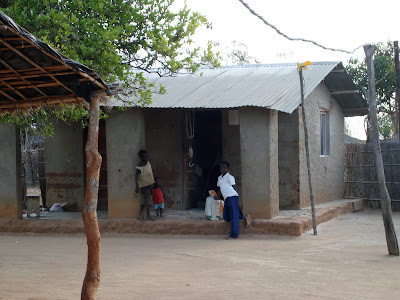We started with Senhor Cipriano's family, who live on the other side of the village at the foot of Ribáuè Mountain. He and his wife invited us into their home, which, though small, was tidy and well maintained, and patiently answered the interview questions we had prepared.
We learned that Cipriano's wife purchases 60 kilograms of maize a month, all of which is prepared and consumed as xima by her family. This is occasionally supplemented by vegetables or dried fish, purchased at the market or, more rarely, chicken meat, provided by the few chickens they raise in their backyard.
We also explained that Fátima is considering purchasing a fortification machine to add nutrients to maize flour during the milling process and were pleased to discover that Cipriano's wife understood the importance of vitamins and thought this was a good idea. This was especially encouraging because we had heard from several TechnoServe employees earlier that there is very little awareness of vitamins in many of these villages. In fact, a similar vitamin fortification project backfired in Tanzania because of misconceptions, particularly that vitamins were something for AIDS patients to prevent weight loss and delay death.
Overall, our interview with Cipriano and his wife was quite heartening, as they both seemed receptive to ideas on improving nutrition and milling practices in Ribáuè. Our enthusiasm was dimmed, though, upon seeing Cipriano's underweight, malaria-stricken baby daughter, a sobering reminder that addressing the multitude of health issues endemic in the village and throughout the region is going to require a great deal of focused effort.
 |
| Path leading up to Cipriano's neighborhood |
 |
| Roadside kiosk selling laundry detergent, tomatoes, and snacks |
 |
| Cabritos near Cipriano's house |
Our next interview was with a professor at the local school and his wife. The fact that we conversed in an outdoor gazebo with electric lights and were served Coca-Cola—both status symbols in rural Mozambique—indicated that their family was relatively better off than the owners of other homes we had seen. Incidentally, the Coke was the first soft drink for this non-soda drinker in over two years. Unceremonious, I know, but 1) I didn't want to reject their hospitality, especially given the region's mistrust of foreigners, and 2) at least it was more flavorful than xima.
In order to gauge the milling habits of the professor's family, we first asked how many kilos of maize flour they go through in a month and how often they visit the mill. We found out that the professor's wife does not take her family's maize to the mill herself but rather delegates this responsibility to her children.
We next asked how many children they have. At first the mother replied "two sons," but we could see that there were several more children playing in the courtyard. The professor then explained that they are actually raising seven children, among them nieces, nephews, and the child of a family friend—stark reminders of the toll of the AIDS epidemic in Mozambique.
 |
| The professor's home and children |
 |
| E as montanhas! |